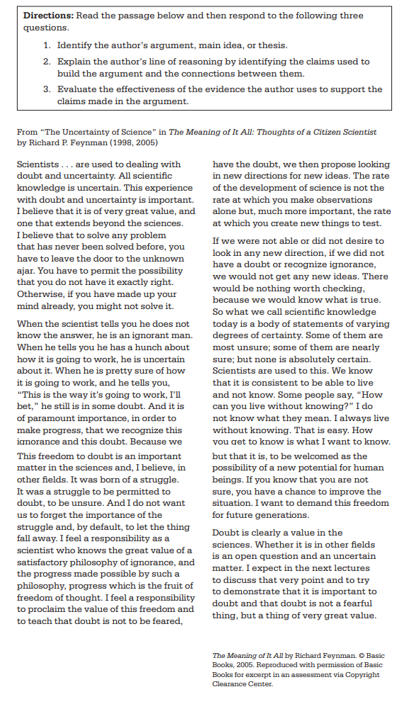Ultimate Guide to the AP Seminar Course and Exam
AP classes are generally stand-alone subjects that easily translate to traditional college courses. They culminate in a standardized exam on which students are graded using a five-point scale, which colleges use to determine credit or advanced standing. However, starting in the fall of 2014, the College Board began to adapt the traditional structure to reflect a less stringent rote curriculum and place a heavier emphasis on critical thinking skills. The AP Capstone program is at the center of these changes, and its introductory course is AP Seminar. Read on for more information about the AP Seminar course and exam and how they can prepare you for college-level work. The AP Seminar course is the first of two classes required for the AP Capstone Diploma—a two-year program with a curriculum designed to develop students’ skills in research, analysis, evidence-based arguments, collaboration, writing, and presenting. Students who receive a score of 3 or higher on the exams for both courses earn an AP Seminar and Research Certificate. Students who receive a score of 3 or higher on both exams and on four additional AP exams receive the AP Capstone Diploma. During the AP Seminar course, you will practice collaborative problem-solving, critical thinking, and student-led investigation. During the second year of the program, you will go on to study AP Research, which applies the skills you developed in AP Seminar to a prolonged research project on a topic of your choosing, build an evidence-based argument, and present it through written and oral defense. The 2020 AP Exams have been changed to online exams due to coronavirus. Learn about these changes in our post How is Coronavirus Impacting AP Exams? The College Board suggests themes such as freedom, justice, and peace as possible examples. You will use an inquiry framework to practice reading and analyzing articles, studies, and foundational, literary, and philosophical texts. You will also listen to and view speeches, broadcasts, and personal accounts, and examine artistic works and performances. By examining materials like news stories, research studies, and literary works, you will learn to craft arguments to support your point of view and communicate it effectively by using various media. This course will also support you as you investigate real-world topics of your choosing from multiple perspectives, which often are different or competing. In addition, you will learn to collect and analyze information with accuracy and precision, develop arguments based on facts, and effectively communicate your point of view. The main educational ideas explored in AP Seminar are broken down into “big ideas.” Within each big idea there are “essential questions,” designed to encourage deep thought about a theme and foster a deeper conceptual understanding of it. Below are the five big ideas of the AP Seminar course, a brief description of them, and their corresponding essential questions. Question and Explore: Challenges students to form their own point of view when facing complex issues by asking questions and investigating answers through the exploration of different, often competing, perspectives. The essential questions of “Question and Explore” are: Understand and Analyze: The understanding and comprehension of others’ ideas and the ability to synthesize and explain another person’s ideas to others. The essential questions of “Understand and Analyze” are: Evaluate Multiple Perspectives: The ability to compare and contrast different perspectives to better understand the complexities of an issue. The essential questions are: Synthesize Ideas: Unifying the gained knowledge, explored ideas, and numerous perspectives to form conclusions on your own. The essential questions of “Synthesize Ideas” are: Team, Transform, and Transmit: Cultivating critical skills of collaboration, communication, and reflection—teaching students how to work best in a team environment. The essential questions are: Only schools that currently offer the AP Capstone Diploma may offer the AP Seminar course. Because it is a part of a larger comprehensive, skills-based program, students may not self-study for the AP Seminar course or exam. At this time, home-schooled students, home-school organizations, and online providers are not eligible to participate in AP Capstone. The AP Seminar exam is structured differently than traditional exams, as a significant percentage of your score is weighted on group work and a presentation which is done outside of the exam. Your performance in the AP Seminar course is assessed through three tasks. Team Project and Presentation | 20% of AP Seminar Score The first is the Team Project and Presentation, which accounts for 20% of your total score. In this project, you will work with a team to create an 8- to 10-minute Team Multimedia Presentation and Defense, in addition to writing a 1,200-word Individual Research Report. Each team member is also asked one question in which they’re required to make an oral defense of their argument. Team Presentation: Your team presentation should propose a solution or resolution and support that idea with evidence and visual media. Your teacher will score your presentation. Individual Research Report: Work with your team to formulate and clarify your individual approach to your investigation of the team’s research question and present your findings and analysis to your group in a well-researched and well-written report. The College Board will score your research report. Oral Defense: Following your presentation, your teacher will ask you to make an oral defense of your argument. Below are some examples of the types of questions frequently asked: Your teacher is responsible for scoring your oral defense. Student Version | 35% of AP Seminar Score The second portion of your assessment is the Individual Research-Based Essay and Presentation, which accounts for 35% of your total score. For this assessment, you will use cross-curricular stimulus texts (released each year in early January by the College Board) to identify thematic connections, compose a research question, conduct research, analyze and evaluate evidence to develop an argument, and present and defend your conclusions. In doing so, you will produce a 2,000-word Individual Written Argument, a 6- to 8-minute Individual Multimedia Presentation, and an Oral Defense where you’ll need to respond to two questions. Individual Written Argument: Using the provided stimulus, identify thematic connections and areas of inquiry and compose a research question that you’ll research and compose a well-written argument conveying your perspective. This is scored by the College Board. Individual Multimedia Presentation: Design an oral presentation using visual media to convey your argument. Your teacher is responsible for scoring your individual multimedia presentation. Oral Defense: Defend your process, use of evidence, conclusion(s), solution(s), or recommendations in response to two types of questions that your teacher will ask—reflection on research process and extending argumentation through effective questioning and inquiry. Below are some examples of the types of questions you may get asked: Reflection on Research Process Extending Argumentation Through Effective Questioning and Inquiry Your teacher is responsible for scoring your oral defense. End of Course Exam 2 hours | 4 questions | 45% of score The final portion of your assessment is the AP Seminar End-of-Course Exam, which is administered like the more traditional AP exams, at a specific time on a specific day, in a formal standardized testing environment. This exam is worth 45% of your total score, clocks in at two hours, and consists of three short-answer questions and one evidence-based argument essay. For the short-answer section, you will read one passage and answer three questions relating to it. For the essay section, you will read four sources, identify a common theme, and create a logically organized, well-reasoned, and well-written argument that presents your own perspective on the theme or issue you identified. Example of a short-answer question you’ll encounter on the AP Seminar exam: In 2019, just over 43,000 students took the AP Seminar assessment. Scores from the 2019 exam reveal an assessment with a high passing rate (score of 3 or higher) but a difficult rate of mastery. While 81.1% of students taking the assessments scored a 3 or higher, only 7.1% received the highest score of a 5, while 58.9% received a 3. A full course description that can help guide your studying and understanding of the knowledge required for the exam can be found on the College Board website. Before you dive into studying, it can be helpful to take a practice test to gain insight into areas you understand well and those that challenge you. You can use the previous end-of-course exams to help assess your skills. They are available on the College Board Performance Task and End-of-Course Exam Samples page. There are also additional practice questions in the course description. Once you have taken some kind of formative assessment for the end-of-course exam, score it to identify the areas you already understand and those in need of improvement. It can be helpful to have a friend or teacher score it, as free-response questions are more subjective than the multiple-choice questions you find on many other AP exams. From an accurate formative assessment, you will get a better idea of where to focus your studying efforts. It is more difficult to evaluate your readiness for the in-class portions of your assessment, but you will work with your teacher on developing these skills throughout the year so you should receive plenty of feedback as you go. If you do not feel that you have a solid understanding of your abilities in this area, make sure to arrange a meeting with your teacher so that you can get some honest feedback about your performance in the class so far. In AP Seminar, you will investigate real-world issues from multiple perspectives, gathering and analyzing information from various sources in order to develop credible and valid evidence- based arguments. The AP Seminar course particularly stresses connections within and across AP courses, encouraging cross-curricular conversations that explore the complexities of academic and real-world topics and issues by analyzing divergent perspectives. The AP Seminar course “aims to equip students with the power to analyze and evaluate information with accuracy and precision in order to craft and communicate evidence-based arguments.” For a glossary of terms that you should be familiar with in this course, see page 119 of the course description. For more information about class structure and specific curriculum content, check out a sample syllabus or review one AP teacher’s end-of-course study materials. Once you have your theory down, test it out by practicing with sample material for the end-of-course exam. You can find some sample questions in the course description and more on the AP Seminar Past Exam Questions Page. As you prepare for this portion of the exam, keep in mind that the four questions on the exam will remain the same each year, though sources and texts will vary. On the first portion of the exam, you will read a source and answer the first three questions. These are: You should allow approximately 30 minutes for the first three questions. The last question asks you to read four sources and you should allow approximately 90 minutes for it. The last prompt is: Read the four sources carefully, focusing on a theme or issue that connects them and the different perspective each represents. Then, write a logically organized, well-reasoned, and well-written argument that presents your own perspective on the theme or issue you identified. You must incorporate at least two of the sources provided and link the claims in your argument to supporting evidence. You may also use the other provided sources or draw upon your own knowledge. In your response, refer to the provided sources as Source A, Source B, Source C, or Source D, or by the authors’ names. As you write your response, you should keep in mind that the College Board has a very stringent set of rules regarding plagiarism. If you’re at all in doubt about whether you should cite a source, do so just to be on the safe side. The full AP Capstone Policy on Plagiarism and Falsification or Fabrication of Information can be found on page 35 of the course description. The through-course assessment pieces for the AP Seminar class are unique from other AP assessments in several key ways. First, they are not administered in a traditional standardized testing environment and instead are completed over an extended period of time in the classroom. Second, they have collaborative elements in which you are required to work together with classmates. Finally, your assessment on these sections is scored by your teacher, not an anonymous AP reader. This is a tremendous advantage. Be sure to maintain good communications with your teacher throughout the year, frequently soliciting feedback on your progress so that you will have a realistic idea of your strengths and areas for improvement. This is the single most effective way to prepare for the through-course assessment pieces. These assessments are completed over several months of the course. The first one, the Team Multimedia Presentation and Defense, consists of a team presentation and an individual research report. In a team of three to five students, you will work to identify, investigate, and analyze an academic or real-world problem or issue. Your team will design and/or consider options and alternatives, develop a multimedia presentation to present the argument for your proposed solution or resolution, and provide a defense to questions posed by the teacher. Your team will divide the group research into individual questions for each team member. Individually, you will then investigate your assigned question on the issue or topic and present your findings and analysis in a well-written individual report. The team project and oral defense will be scored by your teacher alone. The individual research report will be scored by your teacher and validated by the College Board. The second through-course assessment that you will complete is an Individual Research-Based Essay and Presentation, consisting of an Individual Written Argument, Individual Multimedia Presentation, and Oral Defense. You will develop a research topic in response to stimulus texts released by the College Board in early January. Using these materials, you will identify thematic connections, compose a research question, gather additional information through research, analyze, evaluate, and select evidence, and develop a logical, well-reasoned argument of approximately 2,000 words. You will also develop a 6- to 8-minute presentation to convey your perspective and present your conclusions, and then respond to questions posed by your teacher in an oral defense. Your presentation and oral defense will be scored by your teacher alone. The individual written argument will be scored by your teacher and validated by the College Board. As you did at the beginning of your studying, take a practice test to evaluate your progress. You should see your knowledge developing and be able to identify patterns in which areas have improved the most and which areas still need improvement. If you have time, repeat each of the steps above to incrementally increase your score. Because this exam is only available to students enrolled in the AP Capstone program, your teacher will register you for the exam when you enroll in the course. You should confirm with your teacher that you are registered for the exam and your scores and materials are submitted within the College Board’s AP Seminar assessment deadlines. For information about what to bring to the exam, see our post What Should I Bring to My AP Exam (And What Should I Definitely Leave at Home)? For more about information about APs, check out these CollegeVine posts: High school students curious about college admissions will want to check out CollegeVine’s free chancing engine. Using data like GPA, standardized test scores, and extracurricular activities, it can predict your odds of admission at over 500 colleges along with pointing out places to improve your profile—all for free! Sign up for your CollegeVine account today to get a headstart on your college journey.About the AP Capstone Diploma
When is the AP Seminar Exam?
About the AP Seminar Course
About the AP Seminar Exam

AP Seminar Score Distribution, Average Score, and Passing Rate
Exam
5
4
3
2
1
AP Seminar
7.1%
15.1%
58.9%
16.6%
2.3%
Tips For Preparing for the Exam
Step 1: Assess Your Skills
Step 2: Study the Material
Step 3: Practice for the End-of-Course Exam
Step 4: Practice Through-Course Assessment Pieces
Step 5: Take Another Practice Test
Step 6: Exam Day Specifics


